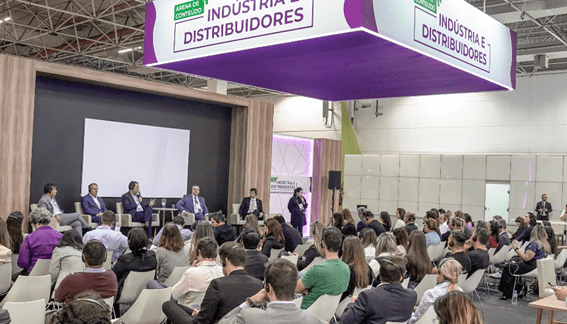Saber ABIMED: economic industrial complex, ATS good practices and regulatory

Publicado em 23/06/2023 • News • English
Located in the mezzanine floor of Expo São Paulo, Saber ABIMED had an auditorium for 200 people and was at maximum capacity in all events, demonstrating that the themes chosen by the entity were very strategic and of great interest.
The debate on “The health economic industrial complex as a vector for the technological, economic, and social evolution of the country” revolved around the current costs that affect the sector’s production chain and how the current fiscal system strangles the industry’s investment capacity. The event was attended by: Diogo Penha, general coordinator of the mechanical, electronic, and materials base of the Health Industrial Economic Complex department; Igor Manhães Nazareth, acting chief executive officer of the Brazilian Industrial Research and Innovation Company (EMBRAPII); and Nelson Mussolini, executive president of Sindusfarma.
“The Complex is placed as a vector for the country’s social development. We don’t just want to produce, we want to foment the production chain, generate employment, and produce the whole cycle here,” Penha pointed out.
Manhães explained how EMBRAPII works and how, in partnership with the Ministry of Health and the Ministry of Science, Technology, and Innovation, it has more than 80 laboratories spread around the country that presents a cooperative, risk-sharing model for investing in technologies and solutions for companies. The Brazilian cost obstacle was another point brought up in the debate. “Tax reform is the only way out we have. Bureaucracy takes money away from investment and generates higher costs, if we compare our reality to other countries,” said Mussolini.
At Saber ABIMED, the entity also presented the study “ATS good practices for procedures and medical devices”. The purpose of the analysis was to show that submissions, assessments, and decisions on incorporating technologies to the Brazilian Unified Health System (SUS) and to the National Supplementary Health Agency (ANS) can be prepared with greater technical and scientific rigor, more quickly, transparently, and with broad social participation.
Gabriela Tannus Branco de Araújo, senior partner of the Axia Bio Group, pointed out that the first to benefit from the study will be the patient. Health Economics and Outcome Research (HEOR) specialist, Sarah Rodrigues believes that the industry has a responsibility to deliver better products from this work. “The industry needs to come out of submission and take on the role of construction,” added Fernanda Oliveira, senior access manager at J&J Medtech.
ABIMED’s Legal & Compliance manager, Jorge Roberto Khauaja, addressed the topic “Trade Impacts – Global Initiatives for Medical Devices Regulatory Convergence”, highlighting important aspects that facilitate the process for regulatory convergence. One of the initiatives highlighted was AdvaMed – the Medical Device Association in the US, based in Washington, DC, which has 100 employees and brings together 450 member companies, 90% of which are new or PMEs (Small and Medium Enterprises).
He also reflected on the lessons learned from Covid-19, a period in which the industry suffered from a shortage of products in the market, a lack of regulatory standards, and difficulties in bringing products into the country, among others. Given the need to eliminate patient barriers, Khauaja said, it is critical to identify and minimize obstacles to medical products. “Regulatory convergence is essential to effect this care, using international standards and references, with cost-benefit assessment.”
Youtube links:
https://www.youtube.com/watch?v=M50YEoipmPQ&list=PLCHvYErZGHnWw3VQNmhqDsLPwI4w_1CkK&index=4

 Portuguese
Portuguese
 Spanish
Spanish
 English
English






















